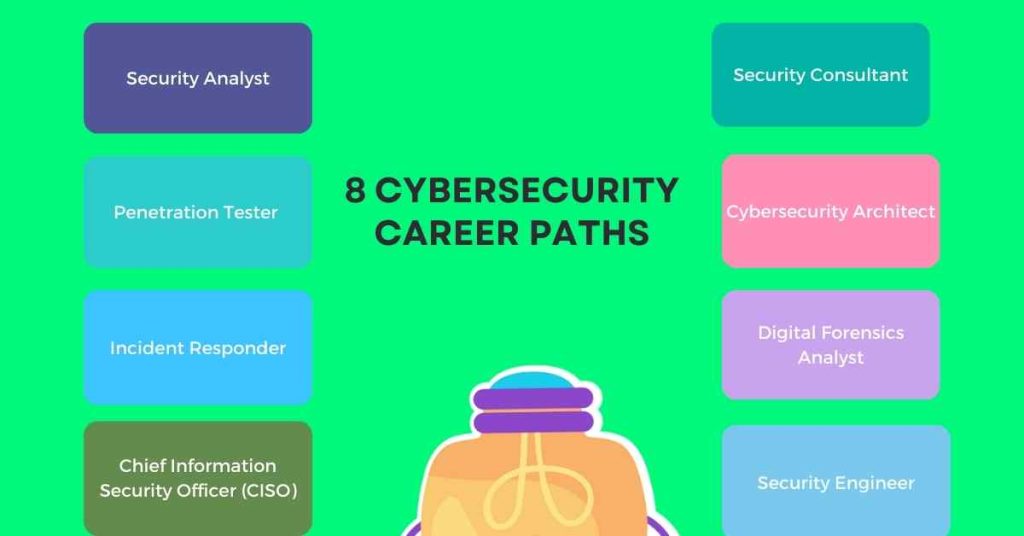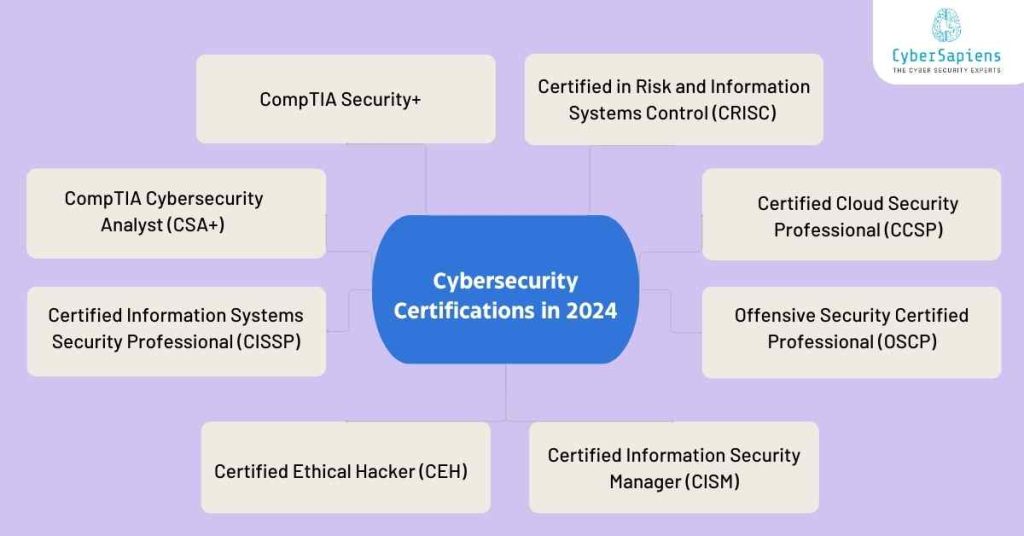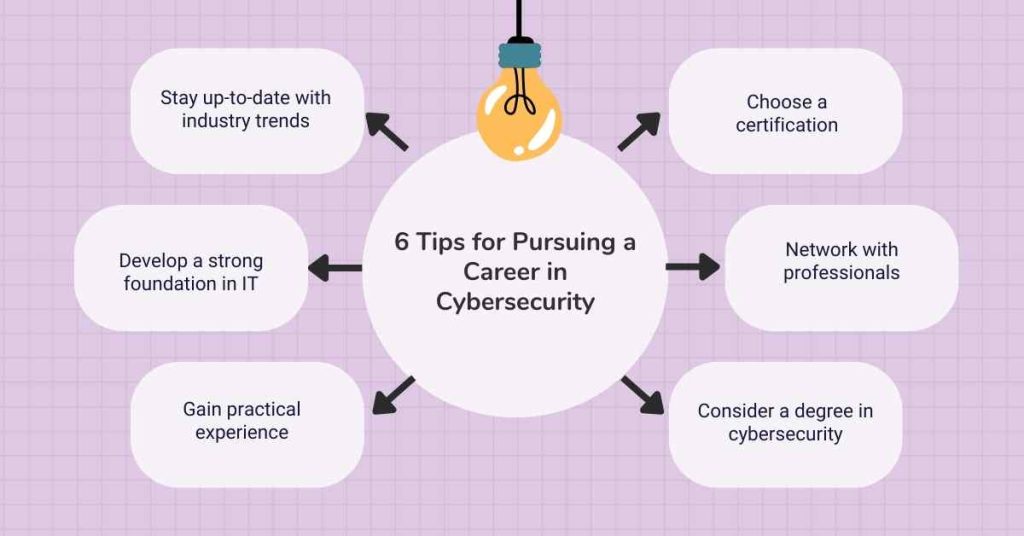People discovered that the development of the new world of digital technology opens many opportunities that have never been seen before, but at the same time, it opens many threats that have never been faced before.
In the age of the digital world where almost everything is controlled by computers and automated, the danger of cyber criminals is of paramount importance.
This is the role of cybersecurity professionals the protectors of cyberspace, fighting for the security of users’ data against cyber threats. As the need for qualified cybersecurity employees continues to grow it is a great time to go into this industry.
This paper aims to present several cybersecurity professions and relevant certificates that can be obtained in 2024.
For every cybersecurity aspirant over there, this article is for you with so much research we brought you the best Cybersecurity Career Paths and Certifications 2024.
Why a Career in Cybersecurity?

Before going into the main topic first, we will see why you should pursue your career in the cybersecurity field, Here are the reasons:
1. High demand
The market of cybersecurity will be $300 billion in 2024 with the volume of job openings being greater than the available talents for those holding cybersecurity degrees.
2. Job security
In today’s world, cybersecurity is one of the essential components of companies and is usually measured in millions as different businesses are willing to pay for their talents.

3. Variety
Cybersecurity is still a generalized area that includes various subdivisions where people are capable of finding employment in different fields.
4. Competitive salaries
Hence, cybersecurity staff is one of the most remunerated across the category of IT professionals and the average medium pay structure can readily exceed a hundred thousand shillings.
5. Sense of purpose
It is quite specific and special to a certain extent because it enables you to be engaged in society’s protection from cyber threats that may harm individuals, businesses, and authorities.
Cybersecurity Career Paths in 2024

Here comes our main topic in this topic we have covered the best cyber security paths in 2024, go through it thoroughly:
1. Security Analyst
Security analysts take time to look at the system data to establish potential risks in the system. They also make and enact policies regarding security to ensure that such infringements do not happen, or in case they do, how to handle them.
2. Penetration Tester
Penetration testers also known as white hat hackers use various techniques to try to breach the organization’s security system. These are used to point out areas of shame and provide suggestions for their enhancement.
3. Incident Responder
In the Cyber world, it is the incident responders who respond to cyber incidents. They quickly react to put off and alleviate the situation and collaborate to bring back the systems and data.
4. Chief Information Security Officer (CISO)
CISO represents Chief Information Security Officer and this is the most senior security officer in an organization. They are also responsible for the overall security strategy and policies of an organization/pro-firm.
5. Security Consultant
Security consultants review the organizational structure and recommend how it can strengthen its security from threats posed by hackers. They give information on the security measures that should be followed and assist in the provision of security.
6. Cybersecurity Architect
A cybersecurity architect is responsible for the planning and setting up of a secure system and security architecture. They make sure that security follows the development cycle or is part of every phase of it.

7. Digital Forensics Analyst
Cybercrime investigators or digital forensic examine, are responsible for auditing hacking incidents and collecting proof that could be utilized in court.
8. Security Engineer
Security engineers set up and oversee the security of systems, applications and networks. They guarantee that security becomes the primary part of the overall process of development.
Cybersecurity Certifications in 2024

Here comes our second main topic in this we have covered the best cyber security certifications in 2024:
1. CompTIA Security+
A starting certification that addresses the security goals and measures, threat and vulnerability mitigation strategies, and typical response to incidents.
2. CompTIA Cybersecurity Analyst (CSA+)
A middle-of-the-range credential that focuses on threats, risks, and responses to security incidents.
3. Certified Information Systems Security Professional (CISSP)
Constituting an upper-level course that includes security and risk management, as well as asset security and security engineering.
4. Certified Ethical Hacker (CEH)
A certification that gives you the credentials for performing penetration testing and ethical hacking.
5. Certified Information Security Manager (CISM)
An IT certification that focuses on issues to do with information security, management of risks, and handling of incidents.
6. Offensive Security Certified Professional (OSCP)
An official course that validates a person’s ability and knowledge in the field of penetration testing and offensive security.
7. Certified Cloud Security Professional (CCSP)
A certification that deals with cloud security architecture, design as well as management.
8. Certified in Risk and Information Systems Control (CRISC)
A credential that you can study for that deals with risk management, information system control as well as IT risk management.
Tips for Pursuing a Career in Cybersecurity

We will not end our article by just providing you about cybersecurity career paths and certifications in 2024 but also we will give you the best Tips for Pursuing a Career in Cybersecurity, Here it is:
1. Stay up-to-date with industry trends
Cybersecurity threats are ever-evolving and have a vast array of approaches and angles and there is always a need to be in a continuous process of learning the threats, protective measures, and technologies.
2. Develop a strong foundation in IT
Cyber security is a subfield of IT and hence needs to have an IT background, so it is wise to have a basic understanding of computing systems, networks and software.
3. Gain practical experience
If possible, try to obtain an internship, volunteer position or any other job position starting in the cybersecurity field.
4. Choose a certification
Select a specific certification that is related to the areas of specialization and workplace and pursue it.
5. Network with professionals
Here it remains to participate in exhibiting events in the industry, read forums, and discuss with professionals working in the sphere.
6. Consider a degree in cybersecurity
Nevertheless, getting the degree is not compulsory, though studying cybersecurity might contribute to the establishment of a firmer foundation and the discovery of even more options.
Conclusion
Cyber security is a fascinating and rapidly growing field with many opportunities job positions, and certifications.
It is effective to maintain passivity regarding the given industry, build the necessary IT framework, acquire practical experience, and select the most suitable certification. People can do their best and achieve fulfilling jobs and make a valuable contribution to decrease the threat of cyber threats.
FAQs: Cybersecurity Career Paths and Certifications 2024
1. What is the average salary for a cybersecurity professional?
Ans: The average salary for a cybersecurity professional varies based on role, location, and experience, but it can range from 80,000$ to 200,000$ per year.
2. Do I need a degree in cybersecurity to get a job in the field?
Ans: While a degree in cybersecurity or a related field can be beneficial, it’s not always required. Many cybersecurity professionals have degrees in computer science, IT, or other fields and have developed their cybersecurity skills through certifications, training, and experience.
3. What are the most in-demand cybersecurity certifications?
Ans: Some of the most in-demand cybersecurity certifications include CompTIA Security+, CISSP, CEH, and OSCP. However, the best certification for you will depend on your career goals, experience, and interests.
4. How do I get started in cybersecurity with no experience?
Ans: You can start by learning the basics of IT, networking, and cybersecurity through online courses or training programs. Look for internships, volunteer opportunities, or entry-level positions to gain hands-on experience.
5. What are the skills required to be a successful cybersecurity professional?
Ans: Successful cybersecurity professionals need a combination of technical skills (e.g., knowledge of networking, operating systems, and security technologies) and soft skills (e.g., communication, problem-solving, and analytical skills).
6. Is cybersecurity a stressful career?
Ans: Cybersecurity can be a high-pressure field, especially during incident response or when dealing with sensitive data breaches. However, many cybersecurity professionals find the work rewarding and challenging.
7. Can I work remotely in cybersecurity?
Ans: Yes, many cybersecurity roles can be done remotely, especially in security consulting, penetration testing, or security analysis. However, some roles may require on-site work, especially in incident response or security management.
8. How do I stay current with the latest cybersecurity threats and technologies?
Ans: Stay current by attending industry conferences, webinars, and training sessions, as well as following reputable sources on social media and online. Participate in online forums and discussion groups to stay informed about the latest threats and technologies.
9. What are the most common industries for cybersecurity jobs?
Ans: The most common industries for cybersecurity jobs include finance, healthcare, government, technology, and e-commerce. However, many industries need cybersecurity professionals to protect their systems and data.
10. Is cybersecurity a growing field?
Ans: Yes, cybersecurity is a rapidly growing field, driven by the increasing need for organizations to protect themselves against cyber threats. The demand for skilled cybersecurity professionals is expected to continue growing in the coming years.












